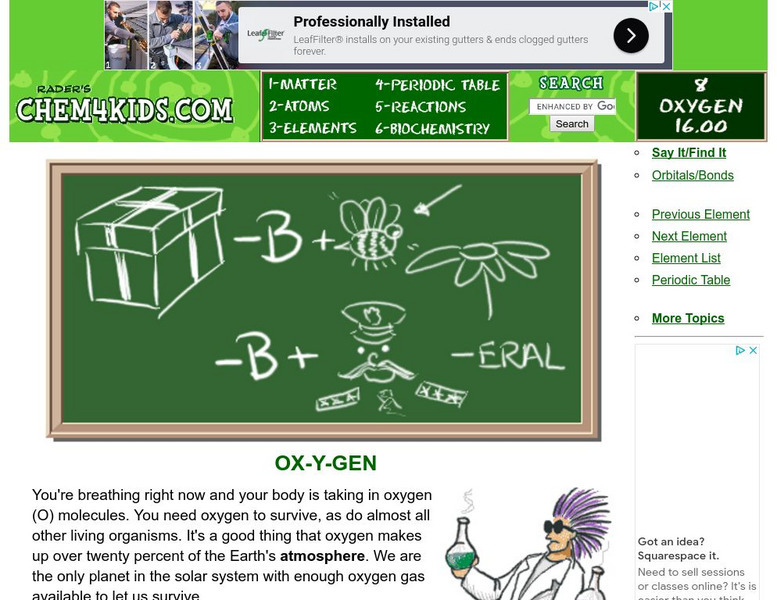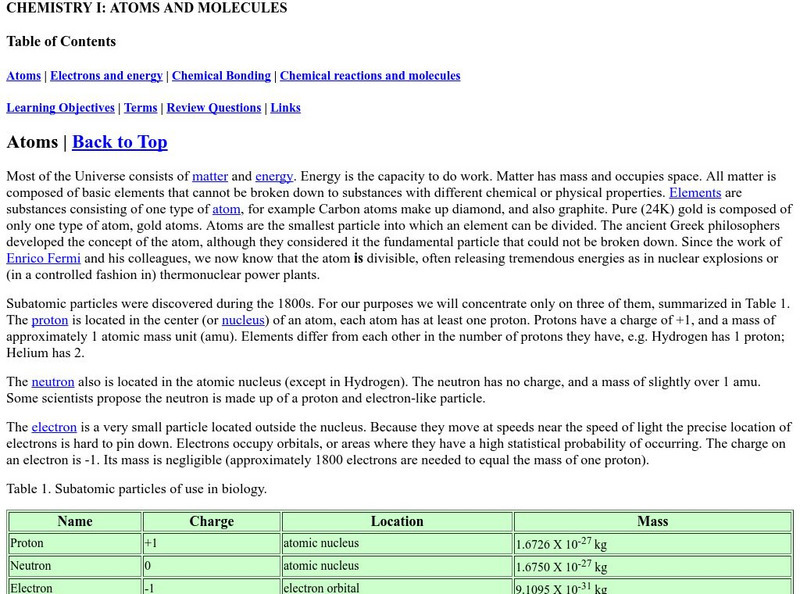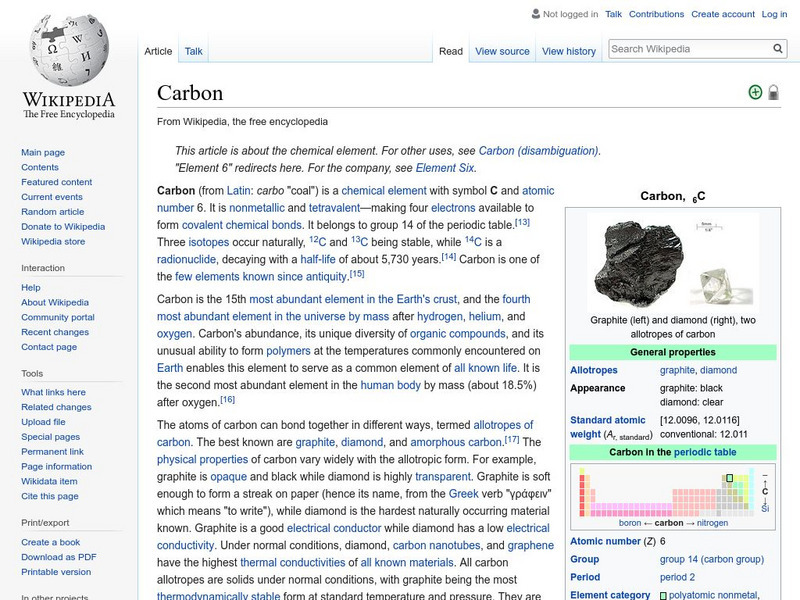Wisc-Online
Wisc Online: Lewis Dot Structures of Covalent Compounds
Short slide show provides basic information about drawing Lewis dot structures for covalent compounds. Starts with anatomy of the atom, and then shows the relationship between atomic particles and the Periodic Table of Elements. Offers...
BBC
Bbc: Gcse Bitesize Science: Atomic Structure
An explanation of atomic structure and the element groups in the periodic table using plain language. Supported by diagrams and charts.
Chem4kids
Chem4 Kids: Lithium
Here at Chem4Kids you can find some great information about the third element in the periodic table, lithium. Content focuses on lithium's electrons, where you can find lithium in nature, and how it bonds with other elements (or with...
Chem4kids
Chem4 Kids: Oxygen (O)
Here you can find some great information about the 8th element in the periodic table, "oxygen." Content focuses on oxygen's electrons, where you can find oxygen in nature and in the home, and how oxygen combines with other elements.
Cosmo Learning
Cosmo Learning: Chemistry 1 A: General Chemistry
A collection of video lectures from a general chemistry course taught at the University of California, Berkeley. The course covers topics like stoichiometry, acid-base and solubility equilibrium, oxidation-reduction reactions, chemical...
Sophia Learning
Sophia: Chemical Reactions: Lesson 6
This lesson will present a basic understanding of the periodic chart of elements and how to predict chemical reactions based on given information. It is 6 of 9 in the series titled "Chemical Reactions."
Sophia Learning
Sophia: Chemical Reactions: Lesson 9
This lesson will present a basic understanding of the periodic chart of elements and how to predict chemical reactions based on given information. It is 9 of 9 in the series titled "Chemical Reactions."
Georgia Department of Education
Ga Virtual Learning: Ap Chemistry: Welcome
An introduction to the College Board's AP Chemistry course, which is designed to be equivalent to a first year college chemistry course.
American Chemical Society
American Chemical Society: Hompage
ChemCenter, available from the American Chemical Society, provides chemistry news, reference sources and other public services.
Sophia Learning
Sophia: Electronegativity
Explore the concept of electronegativity and how it trends across the periodic table of elements. The author uses simple, humorous drawings to help with understanding.
Chem4kids
Chem4 Kids: Alkali Metals to the Left
To the left. To the left. The elements in the left column of the period table are alkali metals with the exception of hydrogen. This is a brief overview of the alkali metals, what their family is all about and how well they bond or do...
Estrella Mountain Community College
Online Biology Book: Chemistry I: Atoms and Molecules
In this online biology textbook, learn about atoms and molecules as they relate to life. Find out about topics such as electrons and energy, chemical bonding, and chemical reactions.
Science Education Resource Center at Carleton College
Serc: Valence Electrons and Trends in the Periodic Table
This instructor led activity will produce a partially filled periodic table that contains electron-dot models for the first twenty elements in the appropriate boxes. It will be used as a visual tool for students to connect concepts such...
State University of New York
State University of New York: Atomic Electron Configuration
This simulation displays the electron configurations of for the elements in relation to the element's position on the periodic table.
Wikimedia
Wikipedia: Carbon
This article from Wikipedia contains great information on the element carbon. Links are provided throughout the article to provided additional information. The topics include: Notable Characteristics, Applications, History, Allotropes,...
Chem4kids
Chem4 Kids: The Noble Gases
Get the skinny on the noble gases on the periodic table. Find out why this family is happy, how well they bond, and exactly who is a part of this happy family.
Sophia Learning
Sophia: Science Tutorial: Matter
Created to teach students of the 21st century, SOPHIA is bringing matter straight to your fingertips. Become the commander of your own learning experiences as you take part in this interactive tutorial. [1:02]
Other
Science Alive: Synthetic vs. Natural: What's the Difference?
Through this reading, young scholars will learn that a substance's properties arise from its molecular structure, not from how it's made (i.e., synthesized by people or found in nature). There is no fundamental difference between natural...
Sophia Learning
Sophia: Characteristics of Matter
A podcast tutorial describing the main characteristics of matter. [1:02]
Museum of Science
The Atom's Family: Mighty Molecules
In this activity, students construct models of molecules using marshmallows and gum drops.
Khan Academy
Khan Academy: Counting Valence Electrons
A short assessment to see if you understand valence electrons in specific elements.
Simon Fraser University
Chem1 Virtual Textbook: Electronegativity
Acting as a subtopic of the General Chemistry Virtual Textbook's section on Atoms and the Periodic Table, this site discusses shared chemical bonds between two elements resulting in electronegative and electropositive outcomes.
Georgia State University
Georgia State University: Hyper Physics: Ionization Energies
A concise description of ionization energy, and a line graph that plots the ionization energies of the first 88 elements vs. the atomic numbers.
OpenStax
Open Stax: Organic Compounds Essential to Human Functioning
Learn here about organic compounds, groups of carbon atoms covalently bonded to hydrogen, usually oxygen, and often other elements as well, and how they are essential to human functioning.























